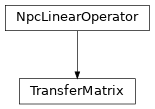TransferMatrix
full name: tenpy.networks.mps.TransferMatrix
parent module:
tenpy.networks.mpstype: class
Inheritance Diagram

Methods
|
|
Return the hermitian conjugate of self |
|
|
Find (dominant) eigenvector(s) of self using |
|
Initialize a TransferMatrix directly from the MPS tensors. |
|
Return a diagonal matrix as initial guess for the eigenvector. |
Given vec as an npc.Array, apply the transfer matrix. |
|
Contract self to a matrix. |
Class Attributes and Properties
|
|
|
- class tenpy.networks.mps.TransferMatrix(bra, ket, shift_bra=0, shift_ket=0, transpose=False, charge_sector=0, form='B')[source]
Bases:
NpcLinearOperatorTransfer matrix of two MPS (bra & ket).
For an iMPS in the thermodynamic limit, we often need to find the ‘dominant RP’ (and LP). This mean nothing else than to take the transfer matrix of the unit cell and find the (right/left) eigenvector with the largest (magnitude) eigenvalue, since it will dominate \((TM)^n RP\) (or \(LP (TM)^n\)) in the limit \(n \rightarrow \infty\) - whatever the initial RP is. This class provides exactly that functionality with
eigenvectors().Given two MPS, we define the transfer matrix as:
| ---M[i]---M[i+1]- ... --M[i+L]--- | | | | | ---N[j]*--N[j+1]* ... --N[j+L]*--
Here the N denotes the matrices of the bra and M the ones of the ket, respectively. To view it as a matrix, we combine the left and right indices to pipes:
| (vL.vL*) ->-TM->- (vR.vR*) acting on (vL.vL*) ->-RP
Note that we keep all M and N as copies.
Changed in version 1.0: shift_bra defaults to 0 rather than shift_ket.
- Parameters:
bra (MPS) – The MPS which is to be (complex) conjugated.
ket (MPS) – The MPS which is not (complex) conjugated.
shift_bra (int) – We start the N of the bra at site shift_bra (i.e. the j in the above network).
shift_ket (int) – We start the M of the ket at site shift_ket (i.e. the i in the above network).
transpose (bool) – Whether self.matvec acts on RP (
False) or LP (True).charge_sector (None | charges |
0) – Selects the charge sector of the vector onto which the Linear operator acts.Nonestands for all sectors,0stands for the zero-charge sector. Defaults to0, i.e., assumes the dominant eigenvector is in charge sector 0. Note that you can update the charge_sector after initialization via thecharge_sectorproperty.form (
'B' | 'A' | 'C' | 'G' | 'Th' | None| tuple(float, float)) – In which canonical form we take the M and N matrices.
- L
Number of physical sites involved in the transfer matrix, i.e. the least common multiple of bra.L and ket.L.
- Type:
- qtotal
Total charge of the transfer matrix (which is gauged away in matvec).
- Type:
charges
- pipe
Pipe corresponding to
'(vL.vL*)'fortranspose=Falseor to'(vR.vR*)'fortranspose=True.- Type:
- label_split
['vL', 'vL*']iftranspose=Falseor['vR', 'vR*']iftranspose=True.
- classmethod from_Ns_Ms(bra_N, ket_M, transpose=False, charge_sector=0, p_label=['p'])[source]
Initialize a TransferMatrix directly from the MPS tensors.
- Parameters:
bra_N (list of
Array) – Plain tensors of the bra and ket, in a list going left to right, the bra not conjugated.ket_M (list of
Array) – Plain tensors of the bra and ket, in a list going left to right, the bra not conjugated.transpose (bool) – Whether self.matvec acts on RP (
False) or LP (True).charge_sector (None | charges |
0) – Selects the charge sector of the vector onto which the Linear operator acts.Nonestands for all sectors,0stands for the zero-charge sector. Defaults to0, i.e., assumes the dominant eigenvector is in charge sector 0.
- matvec(vec)[source]
Given vec as an npc.Array, apply the transfer matrix.
- Parameters:
vec (
Array) – Vector to act on with the transfermatrix. If not transposed, vec is the right part RP of an environment, with legs'(vL.vL*)'in a pipe or splitted. If transposed, the left part LP of an environment with legs'(vR*.vR)'.- Returns:
mat_vec – The transfer matrix acted on vec, in the same form as given.
- Return type:
- eigenvectors(*args, **kwargs)[source]
Find (dominant) eigenvector(s) of self using
scipy.sparse.For arguments see
eigenvectors().If no
charge_sectorwas selected, we look in all charge sectors. The returned eigenvectors have combined legs'(vL.vL*)'or(vR*.vR).